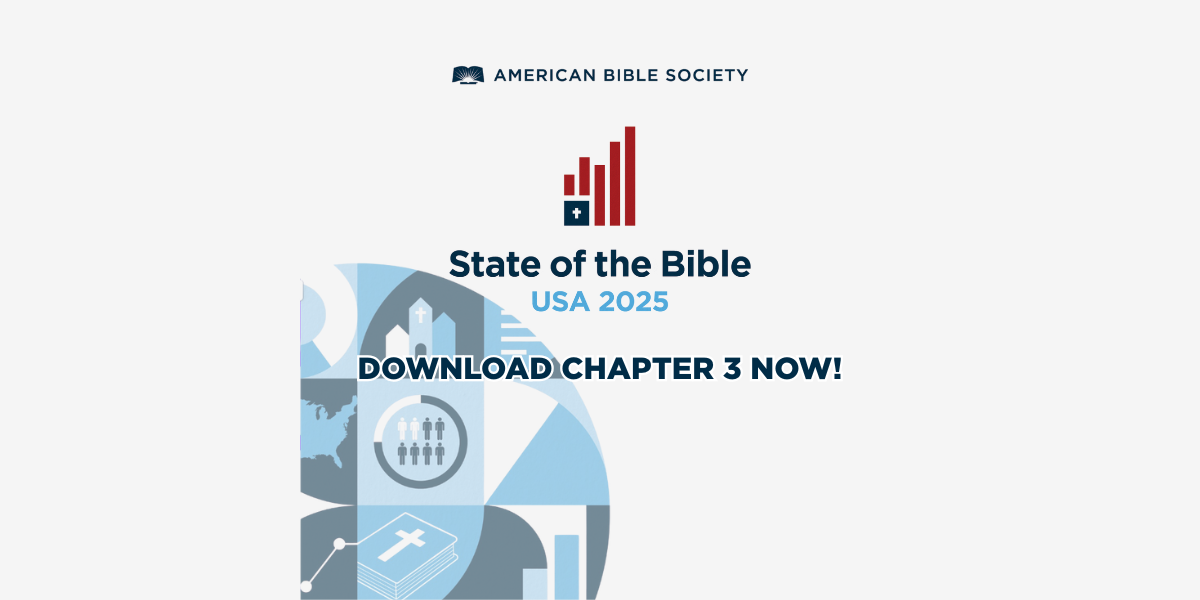PHILADELPHIA, PA — American Bible Society today released the third chapter of their 15th annual State of the Bible report, offering new research on how Americans are engaging with the Bible, faith, and the church. The latest chapter explores how Bible engagement and church involvement cultivate human flourishing. The third chapter of State of the Bible: USA 2025 is available now for download at StateoftheBible.org.
“The study of Human Flourishing, developed at Harvard, has been part of our own survey for several years now,” states John Farquhar Plake, Chief Innovation Officer at ABS and editor-in-chief of the State of the Bible series. “This year we saw an encouraging uptick in flourishing overall and found high flourishing levels among Scripture Engaged Gen Z and Millennials. These findings further support our research into the positive relationship between Bible engagement and holistic well-being.”
The report defines Human Flourishing as “a state of thriving and well-being where all aspects of a person’s life are good.” The State of the Bible study incorporates questions from Harvard’s Human Flourishing Index, which tracks six key domains: Happiness & Life Satisfaction, Mental & Physical Health, Meaning & Purpose, Character & Virtue, Close Social Relationships, and Financial & Material Stability.
State of the Bible findings come from a nationally representative survey performed for American Bible Society by NORC at the University of Chicago, using their AmeriSpeak panel. The data came from 2,656 online interviews with American adults in all 50 states and the District of Columbia. Data were collected from January 2–21, 2025.
Key findings analyzed in Chapter 3: Human Flourishing
- Individuals who experience connection with God tend to exhibit greater human flourishing levels. High human flourishing was observed in 43% of Americans who strongly felt God was active in their lives. Conversely, 41% of those who disagreed about God’s involvement experienced low human flourishing.
- Regularly practicing one’s faith (such as consistent monthly church attendance among Christians who highly value their faith) is linked to higher human flourishing scores (averaging 7.9).
- Increased Bible reading frequency also correlates with greater flourishing, with daily readers scoring 7.9 compared to 6.8 for those who never read the Bible.
- The Boomer+ generation exhibits the highest average human flourishing score at 7.5, significantly surpassing other generations. Gen Z, in contrast, scores the lowest at 6.8. Only 26% of Gen Z individuals reported high human flourishing scores compared to 45% of Boomers. However, both Gen Z and Millennials who are actively engaging with Scripture are flourishing, together averaging a score of 8.1.
- In the United States, human flourishing scores saw a modest but widespread increase in 2025, rising by one or two tenths in nearly every area compared to last year. One notable increase is Gen Z’s Close Social Relationships score, which improved from 6.6 in 2024 to 7.0 in 2025. This places them higher than both Millennials and Gen X in this area and signals a hopeful story for a generation often marked by reports of isolation and loneliness.
- The Global Flourishing Study places the U.S. at 15th for Human Flourishing and 12th for Secure Flourishing among 22 nations. The top five flourishing countries are Indonesia, Mexico, the Philippines, Israel and Nigeria, while “Secular West” countries consistently rank in the lower half. Wealthier nations are grappling with declining scores in crucial flourishing areas like relationships and meaning, as noted by Tyler VanderWeele of The Global Flourishing Study.
Continuing monthly through December 2025, American Bible Society will release six additional chapters in this year’s State of the Bible story. Upcoming findings include trust in institutions and people, church engagement, and behaviors toward friends and neighbors.
To download the third chapter of State of the Bible 2025, visit StateoftheBible.org.





